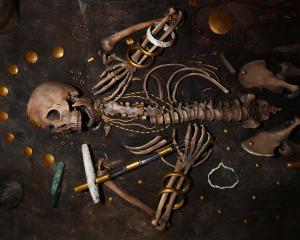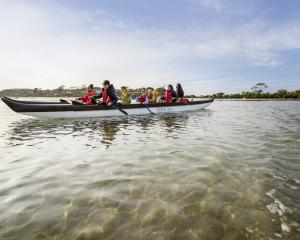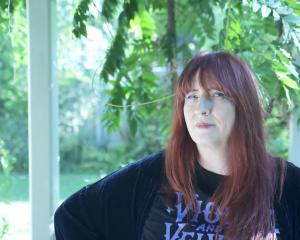
As part of the University of Otago's 150th celebrations it has run a new creative writing competition, "Writer''. Here is the winner in the student prose section.
The Life of George Song
By BENJAMIN CLOW
CHAPTER THREE:
University Days.
A chapter needs to be given to George Song's Otago days. Even though they were brief, it was here Song started to exhibit the qualities and characteristics which he would soon be known for globally. That is: his writing, his love of adventure and his faith. With two suitcases filled with books and warm clothes, Song left his parents' home in Napier for Dunedin in late February 2017 to study law. His parents had to rush up to Auckland for a funeral, so Song hitchhiked to Wellington, slept on a bus shelter bench in Miramar opposite Weta Workshops and took the early flight to Dunedin. Having chosen to neglect the shuttle service offered by the university, he started walking from the airport to the city. He only accepted a ride after it began to rain so much that he couldn't see a metre in front of him. A local farm vet picked him up from the side of the road and having been asked why he didn't organise a ride Song replied, "I like the challenge and I want to be different.''
Song's first year is still unclear. Unable to get into his first choice, Arana, Song was accepted into the newly established Heritage College, situated up towards Roslyn, near the Moana Pool.2 According to a number of eyewitness accounts, he attended a number of flat parties on both Hyde and Castle Sts. He could not keep his room tidy, having failed all his room inspections. He attended lectures irregularly, but never missed a tutorial. One tutor describes Song's tutorial habits as "Unbelievable ... he would barely attend lectures, never did a reading, but could talk for most of the lesson about the topic, despite being heavily critical of the content.'' 3

Song's pre-conversion days have naturally been exaggerated, but the biggest critic of them all has been Song himself, who describes his early life as a "long, unruly scream for help''. Duncan Browning, who didn't properly meet Song until their second year, describes seeing him at a few first-year parties. "Lost souls. Many of us were. Searching for something which we never found.'' 4
An old first-year flame, Ruby Lineham claimed that Song was exceedingly well-behaved for a boyfriend, to the extent of being called a prude. "It's not that he had a very low opinion of sex, it's the fact that he seemed to have a very high opinion of it. And because of that, it never was a topic of conversation. If he was tempted to try something on with me, in which I would have been keen, he never mentioned anything. He'd get drunk and discuss Nietzsche with me but I never once saw him with his top off.'' 5
There are two different narratives concerning Ruby and Song's split. The first, and by-far the more sensational story, involves Song coming back from a Queenstown trip to find Ruby hiding cannabis in his sock draw. There is no evidence for this apart from a few malicious rumours. What was most likely was boredom. Song had become restless within his mind. Nearing the end of his first year, he attended more parties than usual, but would never drink. Instead, parties were for talking to people. It was here that he began to be noticed and known amongst Heritage College. He hated his room, and when the RAs didn't catch him, he'd sleep on the sofa in the lounge room, by the vending machines.6 A series of construction work began in the dining room and recreational rooms of Heritage College in October, forcing Song back into his room.7 It was at this time that he disappeared. He didn't attend any of his end of year examinations. The weekly payments to the hall and the odd "going well'' text to his parents eased off any intervention.
Many claim to have seen Song in this two month period, yet most of the stories seem unlikely. Song's biographer, R. Moore, claims that this time was the beginning of Song's conversion, and that he spent a lot of his time at Knox Church in town, his knees scuffed by the prayers he was making to a God he was unsure of.8 The main justification for this is his classmates seeing him, distraught, with a big book in his hand, wandering on George St by Knox Church. I propose a more believable argument for Song's missing two months. Having grown tired of university life, and his studies, Song had given up to focus on his own interested studies. His library card was still active over the two month period, in which he took out a number of Modernist and Postmodernist books. Song, while being spotted by his classmates, was probably on his way to, or back from, the Govenor's Cafe, a long-running student haunt opposite Knox Church, which has a quiet upstairs reading room. The large book spotted in his hands wasn't the King James, but instead a copy of James Joyce's Ulysses, a book he later mentions reading at university: "In my most pretentious stage I read Ulysses, to impress a girl. It was ghastly, and confusing, and I think I loved every minute of it.''9
Song stayed over the summer and moved to live in the flat at Olveston Manor, above the traditional part of the house which still did guided tours. Song was at his happiest. He read lots and got a bit more money through writing a chess column in the local paper. And over this summer period, Song met the Free-Church Minister, Daniel Laurenson, who had come from Scalloway, Shetland Islands, for a sabbatical. The two met by chance, and Laurenson wrote about him in a postcard to his son in Aberdeen: "Met this rather pompous undergrad this morning in the Animal Attic at the museum here. He quoted either Keats or Wordsworth at me, and asked my views on evolution. Catching up for lunch tomorrow. Poor man probably doesn't have any friends.''10
For the next two months, before classes in 2018 started, the two unlikely companions met weekly. Song brought his questions, and Laurenson did his best to answer them. Song allowed his testimony to be published on the Free-Church website back in Scotland: "Christianity didn't arrive to me when I was low, when I thought I needed it, at a time when I was feeling depressed or down. On the contrary, God gripped me when I didn't think I needed him at all. Life was going swell! And then out of nowhere, I was faced with the reality of my sin, the holiness of a living God, and salvation through Jesus Christ.''11
It was on Laurenson's last day that Song was baptised. The two had met up at St David's Cafe and were then strolling by the Leith and the clocktower, preparing to say their final goodbyes. It was there that Song suggested getting baptised right there, on campus. If any student or lecturer had been on campus that day, they may have seen one 19-year-old and one 60-year-old down by the Leith. They took their shoes and socks off, rolled their trousers up to their knees and stepped into the fast-flowing stream. "In front of God. In front of the Clocktower and the University. It felt right ... it was the wisest decision I'd ever made and it was all God.''12
Laurenson's last task before leaving New Zealand, on that same day, was to install Song in a Christian flat. A room opened up in Duncan Browning's flat, and Song moved in at the beginning of his second year.
Duncan Browning was a student of history whose greatest strength was listening. He studied finance and played rugby for the university team, each with equal enjoyment. Browning and Song's flat was a two-minute walk to the university campus, opposite the North Ground and near Scribes bookstore.13 Also in the flat was Amelia Nightingale, on exchange from Prince Edward Island, Canada. Nightingale, at that time, was working on her first novel, Pember Reef, published three years later while back in Canada. In an email back to Laurenson, Song described her as: "Praying for Chinese Missionaries and Uni students with the same level of fervency ...''14
Nightingale remembered meeting Song two weeks before Song attended the Bible study. It must have been shortly after his conversion. "His room was always messy. I thought he was an old man in a young man's body. He once sat by me at a combined, city-wide church service, he turned to me and asked why they weren't singing any hymns.'' 15
Song didn't last long in Pentecostal churches, unlike Browning, although he did feel that a lot of their enthusiasm was genuine. He soon developed an insatiable appetite for Puritan authors, Owen, Baxter and Sibbes. Dr Martyn Lloyd-Jones, the Welsh minister who preached in Westminster Chapel, became a firm favourite also, with Amelia Nightingale confirming that if there were earphones in Song's ears it would always be a Lloyd-Jones sermon.16 He attended a Reformed church with Nightingale.17
In March, Song entered a novel writing competition in which he did not receive a placing. Song's novel was a Gothic murder mystery set amongst the churches, bookstores and coffee-shops of Dunedin. Browning said that he "read smatterings of it on his old rickety laptop'' finding it "fun but unremarkable''.18 He believed that a number of the characters were modelled after lecturers and first year party animal figures. The winner of the competition was Mulgan Ryan with his 1000-paged space epic titled, "Baxter and the Space-Babes'', a novel set in a parallel universe where New Zealand was at the forefront of space travel. James K. Baxter and Janet Frame undertake a journey through space and time in order to realign the planets of the solar system using their literary genius. Highly praised it was, especially the 100-paged chapter in which Baxter travels through a wormhole while also detailing the history of language through a stream of consciousness. Mulgan remembers meeting George only twice, once at the award ceremony and the second time in the queue for a double-down at the Great King St Kentucky Fried Chicken. He described Song as: "The shyest extrovert I've ever met, and the only undergrad who had ever bothered to read my book.''19
Baxter and the Space-Babes is now out of print. 20
Runner-up was Sonya Bracken's poetry novel "running through a dogpark naked with U.''21 Bracken claimed more than once to have been close friends with Song throughout their undergrad days. Although George's friends and flatmates claimed to have never seen him with her, and neither is there anything in his extensive diary about meeting up with her, she was mentioned in one of Song's monthly handwritten letters to his father. Song described Sonya Bracken as: "... an artsy pixie girl who writes poetry about her sex life and scatters them across the campus. A political creature, she flyered me for a students' association campaign three times in a ten-minute sitting this morning''. 22 Her poetry books always remained bought, but unread, on Song's bookshelf.
In the most unusual turn of events, Song lived next door to an abusive relationship. A sporty med student, who played netball on the weekends, was assaulting her rather timid partner. We don't know why he kept quiet for so long. Biographers R. Moore and G. Lazenby plead Song's ignorance of the situation, arguing that he was unlikely to have been at the flat when most of the assaults took place.23 Nightingale's candid memoirs are much more illuminating: "We all knew what was going on. Even George. It was always loud and for seven days it was violent, and we were quiet.''24
Browning was the one to pull the plug. He called the emergency services, but by then it was too late. By that time, the police were dealing with a suicide. Song, wracked with guilt, skipped classes for two weeks, and stayed at a family friend's in Gore. 25 Browning left the church and Nightingale, unable to remain in Dunedin, booked her flights home earlier, leaving the next month. 26
It is unusual for a biographer to insert himself in another person's story, but it must have been at this time that I first met Song. He was handing out bottled water outside the Med Ball and I, regrettably intoxicated, conversed with him for about twenty minutes. He was quite eager to tell me, and any of the other party-goers who were in earshot, that the island nation of Tonga was one of the least visited countries in the world. Nightingale was also there, conciliating a crying first-year. They were working as a well-oiled pair, and I shook hands with them both. Song, above all, stressed to me the difficulty, but importance, of living by one's principles.
The time had been arranged for Amelia Nightingale's goodbye dinner at the Del Sol on Moray Place. But due to a number of exams and end of semester assignments, Song, Browning and Nightingale were the only ones there.27 Nightingale attributes that evening out as being the inspiration for her second novel, An Island that We Call our Own.
"My second novel, and that meal out, were all about the same thing I guess. The awkwardness of goodbyes, the guilt of past events and the things regrettably left unsaid.''28
Song left the restaurant early, complaining of an upset stomach. Desperate for the bathroom, Song received permission to use the toilets in the Regent Theatre, despite there being a show on. The Regent Theatre, in 2018, was hosting a series of more traditional ballets and operas and was that night hosting "An Evening with Wagner''.29 It's opening piece was, by the Combined Otago and Canterbury Orchestra, The Prelude to Das Rheingold.
This is, doubtless, what Song heard in the bathrooms of the Regent Theatre that night, on May 31st at 7:33pm. "Something had changed. It wasn't an emotional reaction. It was far deeper than that. I was reminded of the beauty of this world. That a violent incident had occurred next door to me, and I was in denial, that a good friend, a dear friend was going back home and I was in denial, and in a time where I had been rush, rush, rush, it was one of the only times I was quiet, and I mean truly quiet, with just me and the music ...''30
A bathroom is an odd location for an epiphany. Yet having examined the acoustics of the Regent Theatre and photos of the old bathrooms, a moment of spiritual, romantic and personal discovery is possible.31 Is this a false memory? A fiction installed to enforce a retroactive retelling of his own university life? Regardless of this, Song was objectively correct on at least one front. Everything in his life was about to change.
Index
[1] B. Nelson, "Ten Crazy O-Week Stories'' in "The Otago Annual'' ed. Terence Young and B. Broccoli (Dunedin: Signal Publications, 2018), 34-36.
2 S. Mendes and C. Fukunaga, Heritage College: A History, (Dunedin: University of Wisdom Press, 2038), 9-11.
3 John Glen, Interviews With Song's Past, (Edendale: Wyndham Books, 2038), 44.
4 Duncan Browning, Through it all, (Auckland: True Life Press, 2045), 24-25.
5 Glen, Song's Past, 121-2.
6 George Song, My Life in Fragments, (Prague: Fireproof Publications, 2029), 56.
7 Mendes and Fukunaga, Heritage College, 99.
8 R.Moore, A Critical Biography of George Song, (North Carolina: Elon University Publication, 2056), 457-59.
9 George Song, My Literary Journey, (London, Deadrose Press, 2032), 22.
10 Daniel Laurenson, Faith and Practise, (Lerwick: Highlands and Skylands, 2025), 42.
11 Laurenson, Faith, 50.
12 Song, Life in Fragments, 71.
13 T. Dalton, Dunedin in the early 20th Century, (Wellington: Sunshine Daily Publication, 2061), 567.
14 The Selected Letters, Emails and Facebook Messengers of George Song, ed. P. Brosnan (London: Deadrose Press, 2061), 23.
15 Amelia Nightingale, Running Away From Green Gables: A Memoir, (Prague: Fireproof Publications, 2059), 113.
16 G. Lazenby, The Man Behind the Song, (New York: Atonement Limited, 2063), 88.
17 Nightingale, Green Gables, 125.
18 Browning's Through It All, 65.
19 Lazenby, The Man Behind the Song, 91.
20 D. Craig, When You've Run Out of Coal: Books to Burn, (Oxford: Morse Press, 2040). 646.
21 P.Hunt, Literary Snobbery: Misses and Big Misses of NZ Literature, (Gore, Valley of Vision, 2020), 32.
22 P. Brosnan, The Selected Letters, 100.
23 Moore, Critical Biography, 603.
24 Nightingale, Green Gables, 90.
25 Browning, Through It All, 77.
26 ibid
27 Song, Life in Fragments, 83.
28 Nightingale, Green Gables, 91.
29 S.T. Connery, Inside the Theatres of Southern New Zealand (Christchurch: No Time to Cry press, 2022), 143.
30 Song, Life in Fragments, 101-02.
31 Connery, Theatres of Southern New Zealand, 140.












